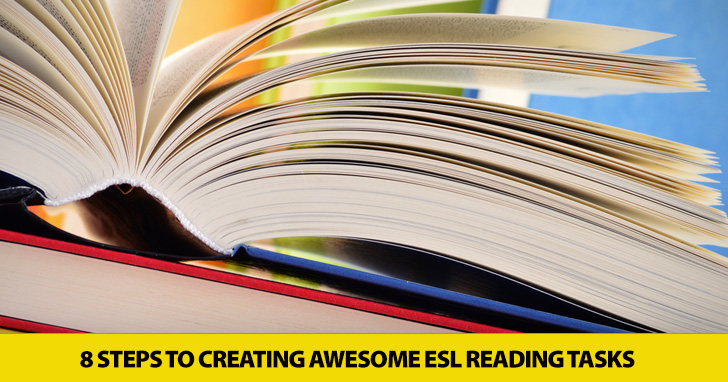8 Steps to Creating Awesome ESL Reading Tasks


I’ve been trying, in recent years, to maximize those opportunities, and to extend and exploit exercises in a variety of ways which do more to practice target language, introduce new and interesting facts, and broaden the scope of the work to include other skills and knowledge.
The aims of doing this is to facilitate the best possible practice of the target material. Students use the material more freely, in different ways, or encounter it through other skills.
If we’re working on a reading exercise about the Olympic games, then we already have some vocabulary and structures to work on from the reading. But all of these are possible extensions:
From a simple starting point, often one provided by a textbook, the teacher has latitude to create integrated (four-skill) tasks with the topic at their core, but which extend far beyond its original boundaries. Students tend to respond well to this; it feels thematic and familiar; if they found the topic interesting to begin with, the students usually follow along enthusiastically. The vocabulary gets extra practice, and often, more new words are added. There is new depth to the work, and students appreciate this thoroughness and rigor.

This is done either at the end of the exercise, or during the following class. Review is essential but sometimes has not been included with the textbook material. Simple, quick check questions to the class, or to individuals, ensure that the material had been retained. Mix closed (yes/no) and open questions, so that the students not only confirm what is correct, they produce the language themselves.
If your students already know how to use modal verbs with fluency, have them use some of these in describing their thoughts about the Olympics: ‘It should be open to everyone,’; ‘Opening ceremonies must reflect the culture of the host nation’. Bring in existing knowledge as a form of review, and as a way to connect this new content with that which the students already know.
I’ve always believed there’s much to be gained from spontaneously checking general knowledge. Any of these things are fair game:
For example, this would be a routine interaction in my class:
| Student: | (Reading) The modern Olympic games began in 1896 in Athens. |
| Teacher: | And where’s Athens, guys? |
| Students: | Greece! |
| Teacher: | Awesome. What language do they speak there? |
| Students: | Greekish? / Greek? / Grecian? |
| Teacher: | Good guesses, it’s Greek (writes IPA on the board). What’s next? |
| Student: | (Reads on) |
This takes a matter of seconds. I feel it’s important to check the pronunciation of nations, cities and languages in particular, as although the student’s own L1 (first language) version may be similar, it is often different. This is especially important with Chinese learners, in whose first language foreign names are often rendered phonetically, and transliterated into Chinese; most of the time, this creates a significant difference between the English and Chinese words. E.g. ‘Yin Du’ may not clearly connote ‘India’, neither might ‘Ying Guo’ indicate England.
As mentioned above, stretching an exercise to practice all four skills isn’t as difficult as you might think. Students who are reading their own writing aloud can serve as the source of an informal listening exercise; simply ask some comprehension questions when they’ve finished. Any speaking exercise can be turned into a brief pronunciation check; just tease out the issues and spend thirty seconds drilling the problem words and sounds. I encourage students to take notes continuously through class, so this is a ‘permanent extension’ to whatever we’re doing. Ensure that they’re making good notes, and especially noting down the details of new vocabulary: the part of speech, synonyms and antonyms, and an example sentence.
Extending and exploiting material is a great chance to practice an important skill of your own: creativity. I encourage every teacher to search their skills set for ways in which they can generate their own material. The virtues of doing so are many, particularly because the teacher knows the class better than any textbook author. This enables you to create material which is especially relevant to your students, which addresses their learning needs, and which taps into their interests. Consider these creative outlets:
I hope that you’ll try this, and that your students will derive as much practice as possible from your classes.